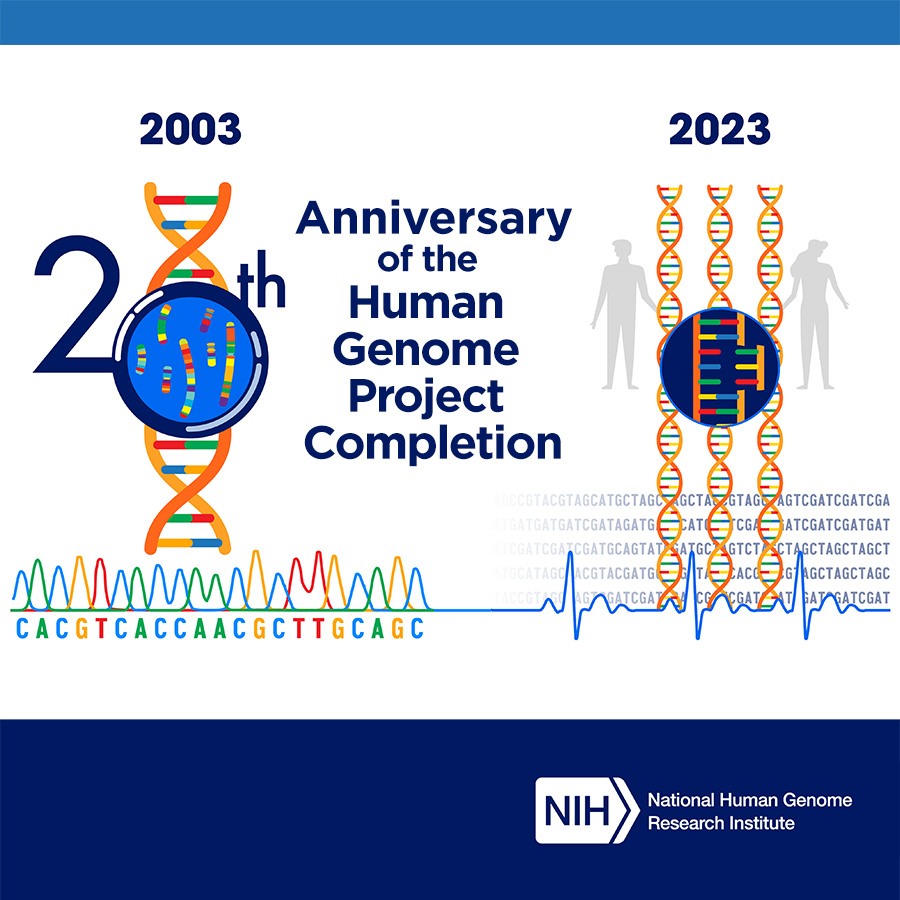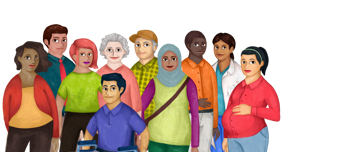
This year marks both the 70th anniversary of the discovery of the double helix and the 20th anniversary of the completion of the Human Genome Project (HGP). Begun in 1990, the HGP was an ambitious endeavor to generate the first sequence of the human genome. We brought All of Us staffers together to reflect on how the HGP laid the foundation for All of Us.
Better Understanding the Genome
The HGP could be seen as the culmination of two centuries of research about how the human body works at microscopic levels. When the HGP began, scientists already knew that chromosomes carried genomic information between cells, but many questions remained.
“With the Human Genome Project, what we were so excited about was having a map of the genes," said Nicole McNeil Ford, Ph.D., an All of Us Program Officer and a former National Human Genome Research Institute (NHGRI) research biologist. "People were familiar with chromosomes, but we didn't really know exactly where most genes were mapped on those chromosomes.”
Scientific Calls for Precision Medicine Research
National Institutes of Health leaders wanted to build on the HGP by incorporating genomic insights into other studies. In May 2004, then-NHGRI Director Francis Collins, M.D., Ph.D., advocated for a large and diverse U.S.-based project to learn more about how genetic and environmental factors impact disease. He proposed that such a study seek to enroll at least several hundred thousand people who would provide DNA samples and other kinds of information over time to support research on a wide range of conditions. He also highlighted the importance of including communities that have been historically underrepresented in health research to help increase understanding of health disparities.
A decade later, Dr. Collins’ vision became a reality. In his 2015 State of the Union address, President Barack Obama announced the initiative that would pave the way for All of Us by drawing on the legacy of the HGP. “I want the country that eliminated polio and mapped the human genome to lead a new era of medicine -- one that delivers the right treatment at the right time,” said President Obama.
The Precision Medicine Initiative (PMI) aimed to accelerate research, in large part by establishing a new million-person cohort study led by NIH. In September 2015, a special working group convened by NIH issued a report offering a blueprint for the study and saying the “time was right” for such a project, given reduced costs of DNA sequencing, increases in computing power, and widespread use of electronic health records and mobile phones that could support additional data collection. Within months, NIH began building a nationwide consortium and infrastructure to stand up the new program. The All of Us Research Program was on its way.
Building on the Human Genome Project
With its latest data release, the All of Us Researcher Workbench is now the largest repository of genomic data widely available for research. Registered researchers can use the platform to combine genomic data with information from electronic health records, surveys, wearable devices, and more–gaining additional insights into participants’ genes, lifestyles, and environments. All of these variables are crucial to consider in developing personalized treatments and prevention strategies.
“Genomics is foundational, but it's not completely deterministic. You're getting a much more in-depth picture of a person's health or state of disease by adding all the information that we're looking at in addition to genetic data,” said Allison Mandich, M.S., who worked as a NHGRI scientific program analyst at the end of the HGP and is now an All of Us Program Officer.
All of Us Chief Data Officer Andrea Ramirez, M.D., M.S., who entered medical school as the HGP was finishing up and later worked in Dr. Collins’ laboratory, agreed. “You can study genomes in isolation, but you won't really learn how to improve health until you understand people’s lifestyles and environments. All of Us builds on what the HGP started 20 years ago. We are not only advancing our understanding of the biology of genomes, but our understanding of the interplay between genetics, environment, and lifestyle.”
This article appears in the April 2023 issue of All of Us Research Roundup. Subscribe to receive future issues of the bimonthly researcher newsletter.
View the full April edition of the All of Us Research Roundup here.
All of Us is a registered service mark of the U.S. Department of Health & Human Services (HHS).
